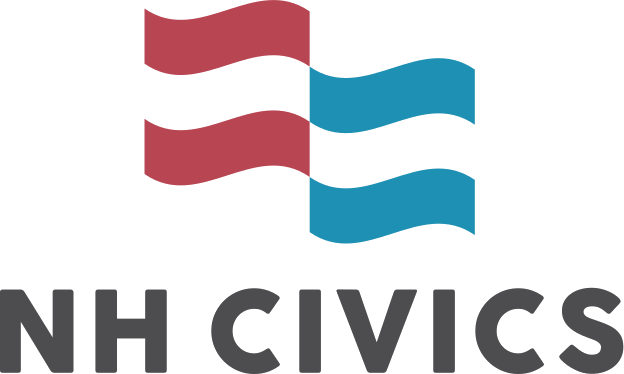Civics 603!
The Civics 603! Program offers a range of exercises for grades 5-12.
The Civics 603! Program Offers a Range of Exercises for Grades 5-12
Civics 603! offers students in grades 5-12 an inside look at how our court system works through meetings with court officials at the New Hampshire Supreme Court performing mock appellate oral arguments or mock trials. The curriculum teaches civic agency, respect for opinions different from one’s own, democratic documents and procedures, and Rule of Law.
WE ARE CURRENTLY ENROLLING FOR OUR CIVICS 603! PROGRAMMING.
Choose from the following options:

This program is supported by the New Hampshire Bar Foundation’s Stanley M. and Thalia M. Brown Fund and the New Hampshire Supreme Court Society.
-
5th-7th Grade Students
Mock Mini-Trials
Available Virtually
For students in Grades Five through Seven, we offer three mini-mock trial programs:
1. State of New Hampshire v. Brianna Hammond: After refusing to leave a construction site where she is blocking construction vehicles from entering the site, 17-year-old high school student Brianna Hammond is arrested for trespassing. Ms. Hammond’s defense to the criminal charge is that her actions were needed to stop the development of a solar power plant on land inhabited by New England cottontails, an endangered species of rabbit. Students will represent either the state or the defendant in a mini-trial that will demonstrate the difficulties encountered when important societal interests in this case, the importance of developing clean sources of energy, concern for wildlife, and the need to respect the law-come into conflict.
2. Pero v. Doe Science Center: An Abenaki family discovers that the Doe Science Center is exhibiting a headdress, an Abenaki ritual object, that they believe belonged to their family. When the science center, which arguably purchased the headdress in good faith, refuses to return the object to the family, the family brings a civil lawsuit for the return of the item. Students will represent the family or the science center in a mock mini-trial that highlights the difficulty in balancing arguably legitimate opposing interests and also provides a vehicle for discussing the ownership of cultural objects and historic and current issues faced by Indigenous People.
3. Eric Roberts v. New Hope School District: Eric Roberts sent a private Snapchat message to his friend about his upcoming birthday party that also contained an unflattering comment about another student (Noah) who was not going to receive a party invitation. Wanting to share information about the party, Eric’s friend sent a screenshot of Eric’s message to a fourth person and that message went “viral,” causing Noah great distress. Thereafter, the school suspended Eric, and this suspension caused Eric to lose a scholarship to a prestigious summer space program. When Eric’s family is unable to convince the school to remove the suspension, it brings a civil lawsuit against the school district, claiming that the suspension was not in accord with the school’s anti-bullying and social media policies and violated Eric’s First Amendment right to freedom of speech. Students will represent Eric or the school district in a mock mini-trial that provides a basis for discussing cyberbullying, the pitfalls of social media, the First Amendment, and the balancing of individual rights.
-
7th-12th Grade Students
Mock Appellate Arguments
Available Virtually
For students in Grades Seven through Twelve, we offer three mock appellate programs:
- Tinker v. Des Moines Independent School District (in which the Supreme Court held that students do not lose their First Amendment right to freedom of speech when they step onto school property and established some standards for regulating speech in public schools)
- New Jersey v. T.L.O. (in which the Supreme Court held that the Fourth Amendment’s prohibition against unreasonable searches and seizures applies to public school officials and established the basic test for evaluating the propriety of school-based searches and seizures)
-
11th-12th Grade Students
Masterpiece Cake
Available Virtually
MASTERPIECE CAKE VS. COLORADO CIVIL RIGHTS COMMISSION
Teachers of upper-level advanced students (for example, 12th grade students in an advanced government course) may also choose to work on the 2018 First Amendment case of Masterpiece Cakeshop, Inc. v. Colorado Civil Rights Commission, which raised the question of whether a bakeshop could decline to make a wedding cake for a gay couple. This exercise fully engages students who are excited to discuss the many complex issues that the case raises.
-
11th-12th Grade Students
Practical Law
Available Virtually
NEW HAMPSHIRE V. DUBE
Civics 603! is now offering a practical law class for upper-level high school students. Through the use of a fictitious criminal case, retired NH Supreme Court Chief Justice Robert J. Lynn and former federal prosecutor Dina Michael Chaitowitz will take your students through multiple stages of the criminal process: pretrial release, suppression, trial, and sentencing. The program is designed for three 50-minute classes but may be modified depending on the needs of your school. While the program was presented via Zoom in the spring of 2020, it can be presented live should regular school programming resume in the fall of 2020.
The Experience
Generally, students travel to the New Hampshire Supreme Court and meet with court officials, learn about one of the cases and, using worksheets provided to them and with the assistance of law clerks, develop mock appellate arguments that they then present to lawyers acting as judges.The in-court program is approximately 120 minutes. At the conclusion of the program, students generally meet with, and ask questions of, one of the judges of the New Hampshire Supreme Court. About a week prior to the courtroom component, a lawyer travels to the school to give the students a one-hour primer on the case and the Bill of Rights, and prepare them for the upcoming argument.
If the school is unable to travel to the Supreme Court, Civics 603! is generally able to have the program go to the school.
This program will also be available virtually.
The program is free to participating schools and support for transportation costs is available to qualifying schools.

Dina Michael Chaitowitz
About the Instructor
Civics 603! is administered by attorney Dina Michael Chaitowitz. Attorney Chaitowitz was a federal prosecutor in the United States Attorney’s Office for the District of Massachusetts for approximately 30 years. In addition to working on federal cases in trial court, she was the Chief of the Appeals Unit from 1994 to 2018, and handled hundreds of appellate matters before the Court of Appeals for the First Circuit. The cases involved, among other crimes, charges of drug trafficking, money laundering, racketeering, and terrorism. Prior to her employment with the United States Attorney’s Office, Attorney Chaitowitz worked as an Assistant District Attorney, prosecuting state crimes in state court, and as a defense attorney. She created Civics 603! because of her deep respect for the justice system and civic engagement.
Interested in enrolling or have questions?
For more information, please contact NH Civics.
Support Civics in NH
NH Civics works to ensure every student in New Hampshire receives a quality and engaging civic education.
